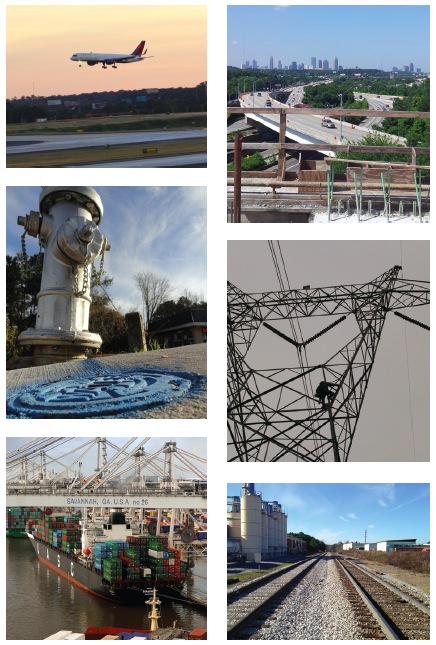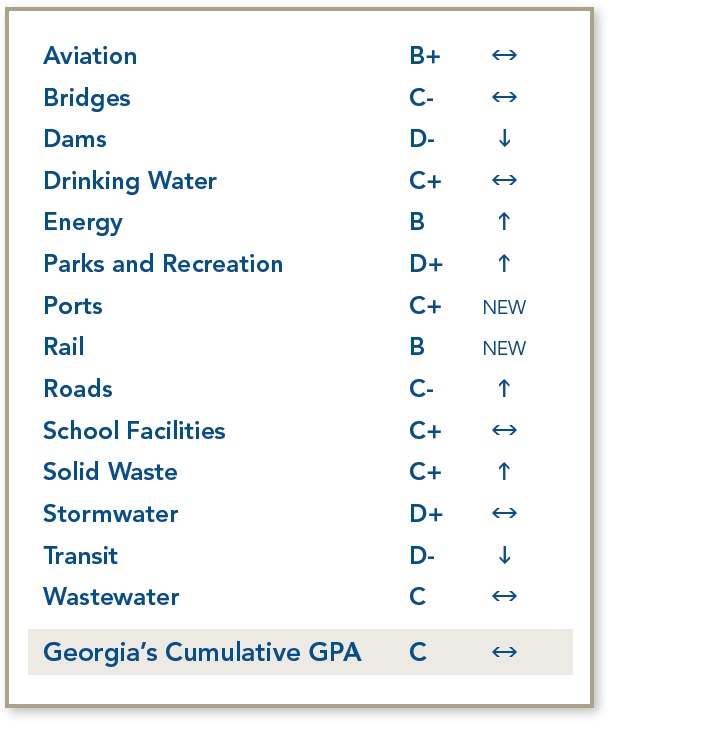AMERICAN SOCIETY OF CIVIL ENGINEERS: GEORGIA SECTION
Executive Summary
 Georgia’s infrastructure encompasses everything from your neighborhood roads to the dam on West Point Lake to the community school to the Port of Savannah. Our state’s infrastructure is vital to the economy, safety, environment and quality of life of all Georgians. Once every five years, the Georgia Section of the American Society of Civil Engineers (ASCE) assesses the state’s infrastructure. Using a simple A to F school report card format, the 2014 Georgia Infrastructure Report Card provides a comprehensive assessment of current infrastructure conditions and needs, assigns grades and makes recommendations for how to raise the grades. The Report Card is written by ASCE members in Georgia who assign the grades according to the following seven criteria: capacity, condition, funding, future need, operation and maintenance, public safety, and resilience. This is the same criteria used by the national ASCE to develop the Report Card for America’s Infrastructure.
Georgia’s infrastructure encompasses everything from your neighborhood roads to the dam on West Point Lake to the community school to the Port of Savannah. Our state’s infrastructure is vital to the economy, safety, environment and quality of life of all Georgians. Once every five years, the Georgia Section of the American Society of Civil Engineers (ASCE) assesses the state’s infrastructure. Using a simple A to F school report card format, the 2014 Georgia Infrastructure Report Card provides a comprehensive assessment of current infrastructure conditions and needs, assigns grades and makes recommendations for how to raise the grades. The Report Card is written by ASCE members in Georgia who assign the grades according to the following seven criteria: capacity, condition, funding, future need, operation and maintenance, public safety, and resilience. This is the same criteria used by the national ASCE to develop the Report Card for America’s Infrastructure.
With new grades for the first time since 2009, Georgia’s infrastructure has shown very little improvement and once again received a cumulative grade of C. The Georgia Section of ASCE assessed the same 12 categories as 2009: aviation, bridges, dams, drinking water, energy, parks and recreation, ports, rail, roads, school facilities, solid waste, stormwater, transit and wastewater. Recognizing the importance of transportation to Georgians, we added two new categories in 2014: ports and rail. As indicated by the grade, much work remains to be done, though there are some bright spots.
Since 2009, significant progress has been made in several areas, including the opening of the $1.2 billion international terminal in Atlanta’s Hartsfield-Jackson International Airport and the approval of two new 1,100 megawatt nuclear units at Plant Vogtle near Augusta. Georgians should be proud of these accomplishments, especially the $14 billion expansion at Plant Vogtle, the first nuclear units in the US since 1979. Significant determination was required to make these accomplishments a reality. This same determination will be needed to address the state’s many other infrastructure challenges.
In the 2009 Report Card, we noted that dam safety must be addressed as dam failure can cause property damage and potentially loss of life. While the Georgia Safe Dams Program has done their best with very limited resources, the number of dams in Georgia is growing. The number of dams per regulatory staff member is five times the national average and the backlog of permits and dam inspections is unacceptably long. This represents an unacceptable level of risk to public safety.
The growth in Georgia’s population to nearly 10 million has led to new infrastructure which brings with it the requirement for maintenance. Georgia has almost 800 structurally deficient bridges and over 2,000 functionally obsolete bridges. Lack of a cohesive transit system makes ridership time-consuming and confusing. The Savannah Harbor Expansion Project needs federal funding to be completed. These challenges must be addressed if the state is to remain competitive in the global economy.
The state’s continued economic prosperity is dependent on a strong, sustainable infrastructure. Georgia citizens and policy makers must unite to address the challenges and issues posed by the current and future state of our infrastructure and respond with dedication and results. Failure to address the requirements of our infrastructure will lead to degradation of basic public services, our quality of life and Georgia’s ability to remain competitive in attracting new businesses.
The 2014 Georgia Infrastructure Report Card is not intended to be a commentary on, nor an evaluation of, the performance of any particular government department, agency or individuals of these groups. In fact, our research found that most agencies have made remarkable progress in fulfilling their ever-expanding responsibilities despite being understaffed and underfunded.
A challenge in producing the Georgia Infrastructure Report Card was to maintain focus on statewide issues and avoid being overly influenced by local needs, especially in the metro Atlanta area. Although in many categories more data were available for the metro Atlanta area, significant efforts were made to make a statewide analysis.
The Georgia Section of ASCE represents nearly 3,000 civil engineering professionals who live and work in Georgia. On behalf of engineers dedicated to problem solving and creating a better quality of life, the Georgia Section presents this document to the citizens and policy makers of Georgia. As in 2009, we must ask ourselves if the grade is acceptable. We believe Georgia should aspire to be “Hope Scholars” with at least a B average. We have some work to do.

Download full version (PDF): 2014 Georgia Infrastructure Report Card
About the American Society of Civil Engineers Georgia Section
www.ascega.org
“The Georgia Section of ASCE is the Georgia arm of the national organization, The American Society of Civil Engineers. We are a professional organization who strives to provide essential value to our members and partners that includes supporting and promoting Georgia Civil Engineers and providing training and networking opportunities. We also strive to advance public knowledge of civil engineering, and serve the public good.”
Tags: American Society of Civil Engineers, ASCE, GA, Georgia, Report Card for America's Infrastructure






 RSS Feed
RSS Feed